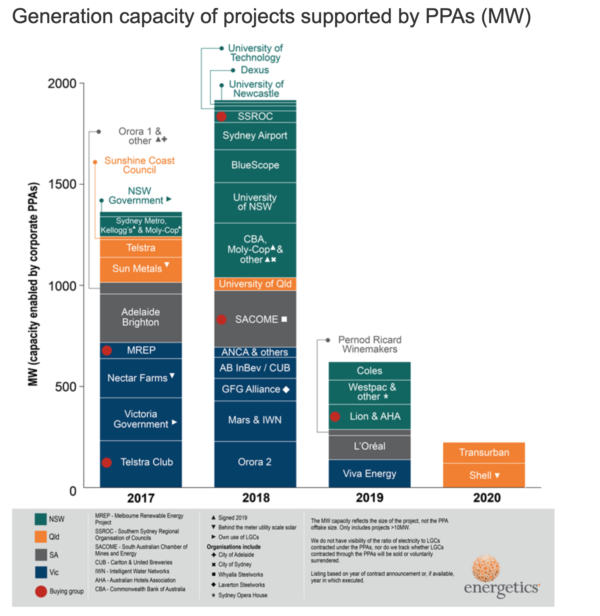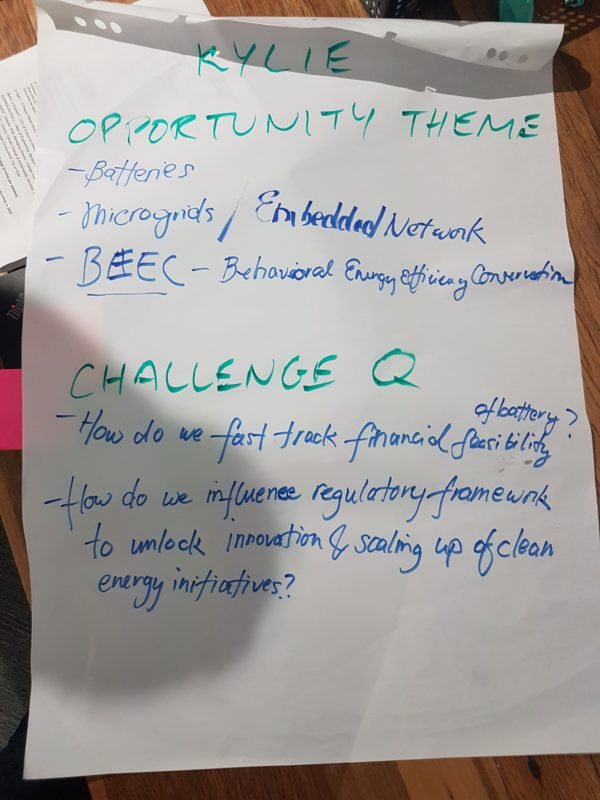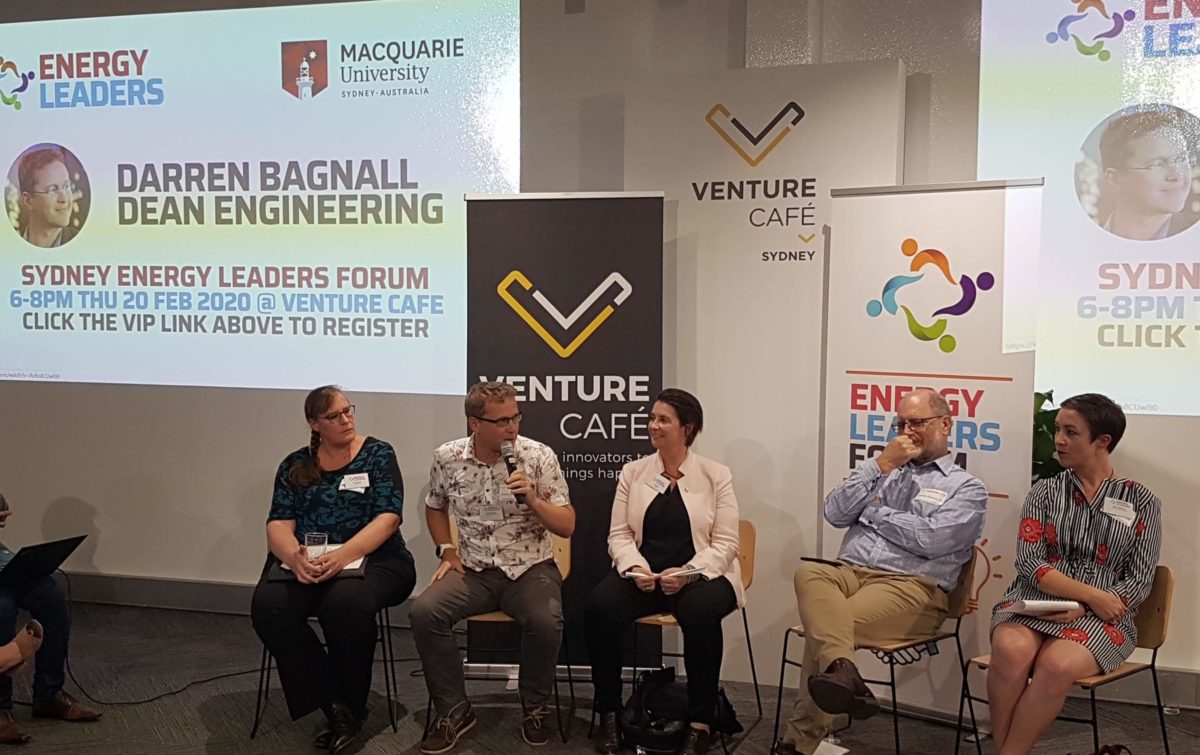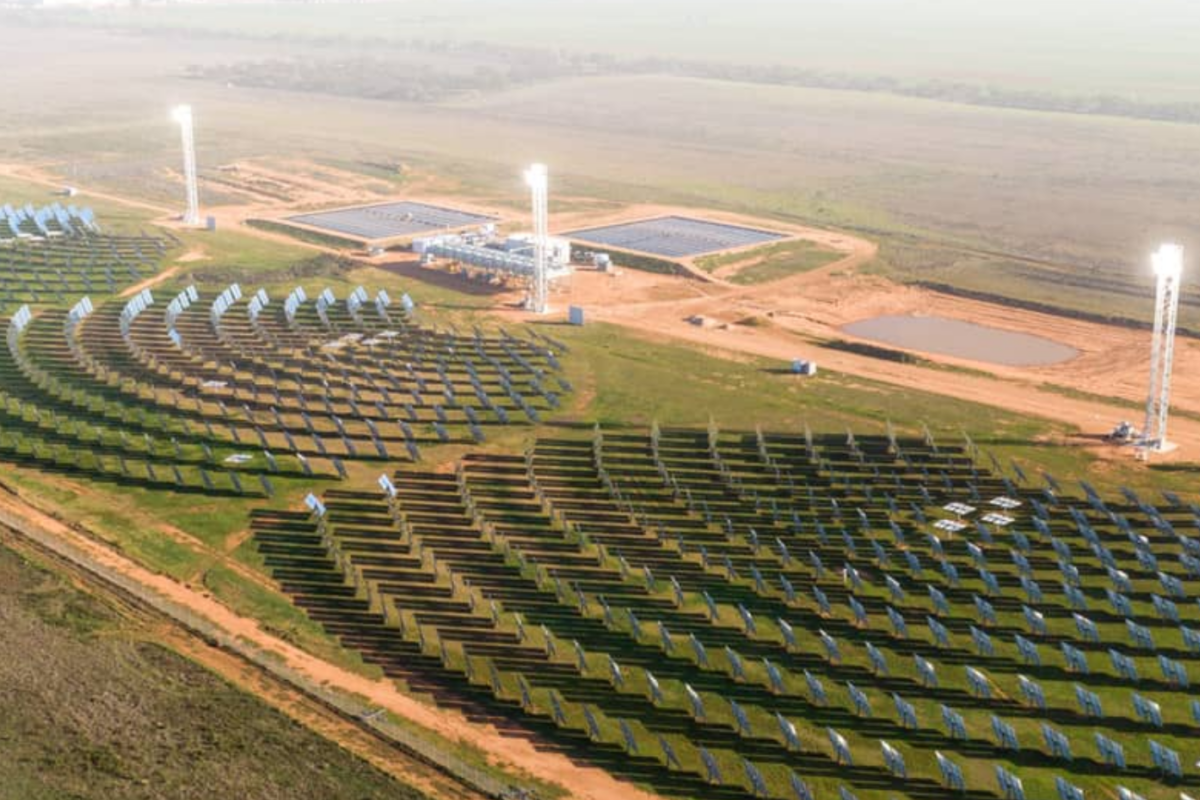“Net-zero by 2050 is good, but that’s the minimum requirement. We need to move faster,” said Energetics’ CEO, Dr Mary Stewart, kicking off discussion at the inaugural Energy Leaders Forum at Venture Cafe Sydney in Macquarie Park last week. “The UK has set a target of 50% reduction by 2030, which is realistically what we need to achieve if we’re going to get even close to that 1.5-degree world where we only lose 70% of our tropical coral reefs.”
At Energetics for the past 10 years, Stewart has been working with big business to address the challenges associated with both their energy and climate-risk portfolios, facilitating power purchase agreements between renewable energy providers and corporates (Sydney Airport, Mars, Coles, Westpac and this year Transurban and Shell).

Graph: Energetics
At the Energy Leaders Forum (ELF) meeting at Macquarie Park, she put the case for faster action on emissions reduction.
The very next day, Friday, Labor Leader Anthony Albanese committed his party (if elected) to the now common country goal of adopting a zero-emissions target by 2050, and Prime Minister Morrison slammed the Opposition’s lack of modelling of the economic impacts of such a commitment.
Modelling of climate change and its impacts on worldwide health, food production, biodiversity and other aspects of life on earth has already been extensively carried out by global agencies and trusted scientific researchers at Australia’s CSIRO, showing that the outcomes of not acting should be galvanising.
On the cost side, Lisa Wade, Director of Product and Channel Development at National Australia Bank, says the bank had calculated that US$100 trillion of investment would be required over the coming 30 years to transition the world to a low-carbon economy.
Panellists at ELF agreed 2050 is too distant a target for the kind of mass-mobilisation required. “The thinking of a lot of companies is not to do anything because it’s beyond their planning horizons,” says Stewart.
The opportunity she posed was for more big businesses to take “big”, “brave”, “nation building” decisions in 2020 and progressively into the future.
Investment via blockchain
Wade, who founded Australia’s first Clean Energy Equity Fund in 2007, and co-founded Impact 2080, is focusing on blockchain as a mechanism to more swiftly channel investment to projects that will make a difference.
The imperative, she says, is for people to “embrace technologies that can create funding synergies and remove friction from funding.
“If I can create a digital asset out of energy that is coming out of any renewable energy project and I can track and trace that kilowatt hour … as a funder sitting at my desk I can gather enough of those immediate digital assets, create a digital security and send that to market almost instantly.”
Simon Dawes, a Director at EY working in the company’s climate-change advisory services team, posited the related opportunity in harnessing “sensors and ubiquitous 5G” for allowing “distributed energy resources, demand response and energy efficiency to be tailored to minute-by-minute 1 kW transactions sold through blockchain to industry and everybody else.”
Speaking with pv magazine at the ELF event, Wade lauded blockchain-based start-ups such as WePower, which last week announced a $10 million power purchase (PPA) transaction between QEnergy and People Energy on its standardised, digitised contractual architecture using transparent blockchain-enabled accounting; and Power Ledger, which is creating blockchain-based platforms for peer-to-peer energy trading, trading of environmental commodities and access to renewable asset ownership for households unable to install solar PV systems.
Individual commitment can lead to benefits for all
Kylie McMahon, Manager of Sustainability and Environment for the 124,000 residents and business owners in the City of Ryde within greater Sydney, said the three main areas of challenge and opportunity across her council remit are: decarbonisation, resilience planning and advocating for equal access to renewables for residents living in energy poverty due to the ongoing high cost of electricity sourced solely from the grid.
A common rallying point among the five speakers and subsequently at networking drinks, is that, “As individuals we all need to try to do more” — in this case the words of Professor Darren Bagnall, Dean of Engineering at Macquarie University and himself an alumnus of UNSW’s powerhouse of solar development, the School of Photovoltaic and Renewable Energy Engineering.
Convenor of ELF, Luke Poliszcuk, who partnered with Venture Cafe Sydney, to create the ongoing monthly (first Thursday of the month) forum with the intention of, connecting energy professionals and fostering solutions — working methodically from fast ideation on butchers’ paper to project development and investment — told pv magazine on the following day that the forum had already led to actions.

Photo: Energy Leaders Forum
Professor Bagnall, who is also head of the Sustainable Energy Institute at Macquarie University had proposed a partnership between ELF and the University to engage the student body, alumni, academics and the broader community around Macquarie Park — which as Kylie McMahon noted has an annual emissions footprint of 480,000 tonnes that must be reduced.
Lisa Wade and Angela Bee Chann, CEO at Hackathons Australia are organising a blockchain hackathon session.
A multidisciplinary approach
Among the attendees at the forum, Nick Keynes, of Ecovantage energy-efficiency solutions told pv magazine, “It was great to see so many different types of people — from councils, banks, consultancies, technology providers and so on — who share a common goal of improving efficiency, providing clean energy and reducing emissions.” Keynes added that he was excited at the ongoing prospect of meeting with people who are committed to “implementing new ways of doing things”.
Poliszcuk said several important topics identified by participants networking at the event would be moved into the next level of focus for ELF gatherings. They include: “How to make everyone care enough that they will each drive the change we need”; enabling the internet of energy; and advancing development of batteries alongside the potential for central ownership of batteries within communities of users.
Bagnall suggested that concentrated efforts to make solar energy cheaper should now shift to reducing the costs of energy storage as a critical factor in advancing the efficient use of solar energy and its on-demand availability to the market.
The next Energy Leaders Forum will take place on the evening of March 5 at Venture Cafe Sydney (58 Waterloo Road, Macquarie Park) with a stellar all-female panel of speakers in honour of International Women’s Day drilling down into the topic: Future Grid 2.0: Energy recovery and resilience in the wake of disaster.
This content is protected by copyright and may not be reused. If you want to cooperate with us and would like to reuse some of our content, please contact: editors@pv-magazine.com.









1 comment
By submitting this form you agree to pv magazine using your data for the purposes of publishing your comment.
Your personal data will only be disclosed or otherwise transmitted to third parties for the purposes of spam filtering or if this is necessary for technical maintenance of the website. Any other transfer to third parties will not take place unless this is justified on the basis of applicable data protection regulations or if pv magazine is legally obliged to do so.
You may revoke this consent at any time with effect for the future, in which case your personal data will be deleted immediately. Otherwise, your data will be deleted if pv magazine has processed your request or the purpose of data storage is fulfilled.
Further information on data privacy can be found in our Data Protection Policy.